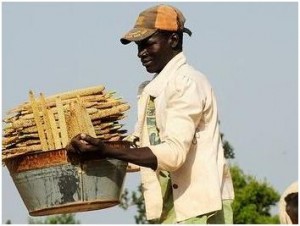There is a growing consensus that many of our production systems for food, forest and wetland products are unsustainable–for people, for long-term food and fiber supply and for nature. Yet from sustainable fish farming in Spain to rice intensification systems in Sri Lanka, people are working together to find better ways to meet our current and future demands for food and fiber while also protecting nature’s services and local livelihoods. Farmers, policymakers, food companies, conservation agencies and grassroots organizations in all parts of the world are generating innovations to meet the challenge. Since over two-thirds of the world’s land area is shaped by cropland, planted pastures, or other agricultural practices, it is critical to scale up such integrated systems to combat both hunger and environmental degradation.

An international project, Landscapes for People, Food and Nature Initiative (LPFN), is working to strengthen these innovative approaches. The three year, collaborative initiative aims to scale up successful strategies that simultaneously improve livelihoods, conserve biodiversity and ecosystem services, and feed the world while helping to address climate change.
Through an on-going Global Review, LPFN is collecting information and key perspectives on such integrated farming landscapes. In March 2012, a series of multi-stakeholder dialogues will be kicked off with an international forum in Nairobi, Kenya, bringing together thought leaders and innovators to interpret results of the Global Review and develop action agendas. These findings will then be promoted by LPFN’s Action and Advocacy project, focusing on strengthening policy, investment, capacity building, and research agendas in countries committed to scaling up integrated landscape approaches to support sustainable land management.
Together, LPFN co-organizers are working at the landscape level in over 60 countries around the world to promote integrated agriculture-ecosystem-climate initiatives. Through their work , the LPFN will provide direct input to key policy conversations within the UN Conference on Sustainable Development (Rio+20), UN Framework Convention on Climate Change (COP17), Committee on World Food Security (CFS), and important regional platforms such as the New Partnership for Africa’s Development (NEPAD), thus helping shape discussions on agriculture and food policy towards more effective and sustainable solutions.
By Jenna Banning

Danielle Nierenberg, an expert on livestock and sustainability, currently serves as Project Director of State of World 2011 for the Worldwatch Institute, a Washington, DC-based environmental think tank. Her knowledge of factory farming and its global spread and sustainable agriculture has been cited widely in the New York Times Magazine, the International Herald Tribune, the Washington Post, and
other publications.
Danielle worked for two years as a Peace Corps volunteer in the Dominican Republic. She is currently traveling across Africa looking at innovations that are working to alleviate hunger and poverty and blogging everyday at Worldwatch Institute’s Nourishing the Planet. She has a regular column with the Mail & Guardian, the Kansas City Star, and the Huffington Post and her writing was been featured in newspapers across Africa including the Cape Town Argus, the Zambia Daily Mail, Coast Week (Kenya), and other African publications. She holds an M.S. in agriculture, food, and environment from Tufts University and a B.A. in environmental policy from Monmouth College.








